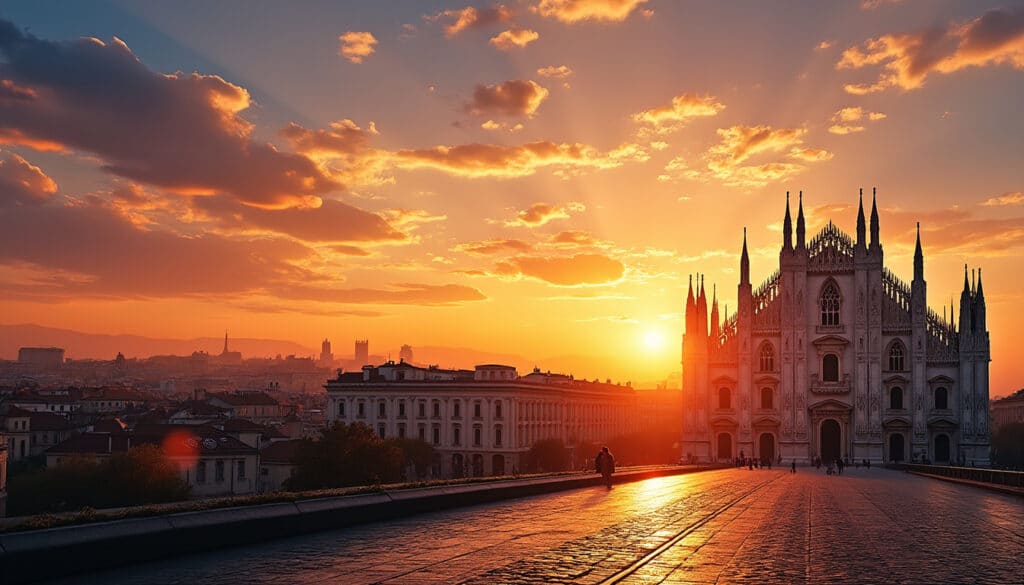The fascinating and historic city of Milan, renowned for its stunning architecture, fashion-forward culture, and bustling lifestyle, also faces some significant natural challenges. Among these, flooding and other natural risks pose substantial threats to both the city and its inhabitants. From the plains of the Po River to the urbanized centers, understanding these risks requires a multifaceted approach, intertwining urban planning, technology, and community engagement. Through exploring the diverse aspects of Milan’s flood risks, innovative solutions, and its community’s resilience, this article delves deep into what makes Milan not just a center of style but also a beacon of modern urban risk management.
Understanding the Flood Risks in Milan: Key Drivers and Consequences
Flooding in Milan is a complex issue driven by both natural and man-made factors. The convergence of the Lambro and Seveso rivers within the metropolitan area heightens the risk of overflow, particularly during intense rainfall. In addition, the city’s geography, marked by its low-lying areas and extensive urbanization, exacerbates this vulnerability. 🌧️
These watercourses are susceptible to sudden upswings during heavy downpours, which have become increasingly frequent in recent years due to the effects of climate change. Events like the storm on July 25, 2023, demonstrated the power of these environmental shifts. That day, Milan experienced gusts over 100 km/h alongside 40 mm of rain, leading to significant damage including uprooted trees and interrupted transport. ⏱️

In addition to natural factors, human actions have intensified the city’s flood risks. Extensive urbanization has led to low permeability surfaces, reducing the city’s ability to absorb rainwater effectively. Areas once capable of dispersing rainfall now struggle to manage runoff, leading to increased water accumulation in certain neighborhoods. In determining flood risks, authorities examine:
- 🌆 Exposure: Refers to the buildings and population in threatened areas.
- 🏠 Vulnerability: The propensity of these elements to sustain damage during extreme weather.
- ❗ Danger: The probability and intensity of potential floods.
This multifaceted understanding of risks underscores the need for comprehensive urban planning and community engagement to mitigate these challenges.
Neighborhoods in Milan Most Vulnerable to Flooding
In Milan, certain neighborhoods are more prone to flooding than others due to their geographical and infrastructural characteristics. The northern districts, particularly around the Seveso River, bear the brunt of flooding incidents. Niguarda and Piazzale Istria have historically seen repeated episodes of inundation due to the proximity and overflow of the Seveso, further compounded by less effective drainage systems.
Meanwhile, the southern areas near the Lambro River are not exempt either. Here, neighborhoods like Monluè experience sporadic flooding, particularly during storms, which can disrupt daily activities and affect local businesses significantly. 👨👩👧👦
To better understand the allocation of risk and mitigation resources, a table of key neighborhoods and their risk factors helps illustrate the situation:
| Neighborhood | Major Risk Factors | Mitigation Measures |
|---|---|---|
| Niguarda | Proximity to Seveso, poor drainage | Enhanced drainage systems, community alerts |
| Piazzale Istria | River overflow, urban density | Milan AquaGuard, EcoFlood Solutions |
| Monluè | Close to Lambro, infrastructural gaps | Urban Flood Defense, FloodShield Technologies |
Local authorities, alongside initiatives like Milan Flood Watch and Milan Natural Risk Management, are striving to reduce impacts through innovative solutions and enhanced communication strategies.
Innovative Solutions to Combat Flooding in Milan
As flooding becomes a more pressing concern, Milan has adopted several innovative strategies to mitigate its impacts. These solutions blend technology, urban planning, and nature-based systems to create a more resilient city. Of particular interest is the deployment of EcoFlood Solutions and AquaBarrier Systems, which have been instrumental in reducing flood risks.
EcoFlood Solutions focus on integrating green infrastructure into the urban landscape. This approach includes:
- 🌳 Green spaces: Parks and urban gardens that absorb and store rainwater.
- 🏗️ Permeable pavements: Reduce runoff by allowing water to percolate into the ground.
- 💡 Water retention systems: Collect and store rainwater for reuse during dry periods.
On the technological front, initiatives such as FloodSmart Innovations and FloodSafe focus on enhancing predictive capabilities and improving infrastructure resilience. These include advanced forecasting systems and real-time flood monitoring technologies, which are essential in providing timely warnings and adaptation measures.
Furthermore, the city’s Urban Flood Defense strategies emphasize building robust infrastructural defenses such as flood walls and retention basins, which are strategically placed to divert and manage excess water during heavy storms.
Role of Community Engagement in Flood Risk Management
A crucial element of Milan’s approach to tackling natural risks is active community involvement. By fostering a culture of preparedness and proactive citizen participation, the city empowers its residents to face challenges and work collectively towards solutions. 🤝
The city’s civil protection system has been instrumental in raising awareness through educational programs and community drills, teaching families about emergency response plans and safety measures. In emergencies, timely alerts are dispatched via several channels:
- ☎️ Landline and mobile calls with pre-recorded messages.
- 📱 Civil Protection App for real-time updates.
- 🌐 Official website and social media for broader outreach.
This multi-tiered communication strategy ensures that all residents are informed and can take appropriate action in case of impending flood events. Local organizations also conduct workshops to educate communities on utilizing green spaces to buffer against flood risks, further integrating them into the city’s flood-safe infrastructure. The collaboration between citizens, municipal bodies, and technological innovators like SafeMilan is vital to fortifying the city’s resilience against natural elements.
The Importance of Forward-Thinking and Preparedness in Milan
Planning for the future is critical in mitigating the challenges posed by flooding and natural risks in Milan. The city’s administration, in collaboration with organizations like Milan AquaGuard and FloodShield Technologies, is advancing strategies for sustainable urban development.
Key to these strategies is the integration of forward-thinking urban planning with comprehensive risk assessments. By evaluating potential scenarios, Milan can implement adaptive measures that not only address current challenges but anticipate future ones. Critical components include:
- 🛰️ Advanced predictive models to identify at-risk areas and plan interventions.
- 🛠️ Regular updates to urban infrastructure to enhance resilience.
- 🌱 Extensive green networks to naturally manage water excess.
Moreover, Milan embodies a blueprint for other cities grappling with similar environmental challenges. The city’s focus on collaboration between municipal authorities, scientific experts, and its proactive citizenry serves as a model of resilience and adaptability. Through continuous innovation, Milan not only safeguards its historical treasures but also ensures the prosperity and safety of its future generations.
FAQ
- How often does Milan experience flooding? While not regular, Milan’s flooding events have increased in recent years mainly due to climate change and urbanization.
- What measures can residents take during a flood warning? Residents are advised to follow official alerts, secure valuables, and evacuate if necessary. Staying informed through Milan Natural Risk Management tools is critical.
- How is Milan addressing climate change impacts? Initiatives like Urban Flood Defense and FloodSmart Innovations focus on creating sustainable infrastructures and enhancing predictive capabilities.
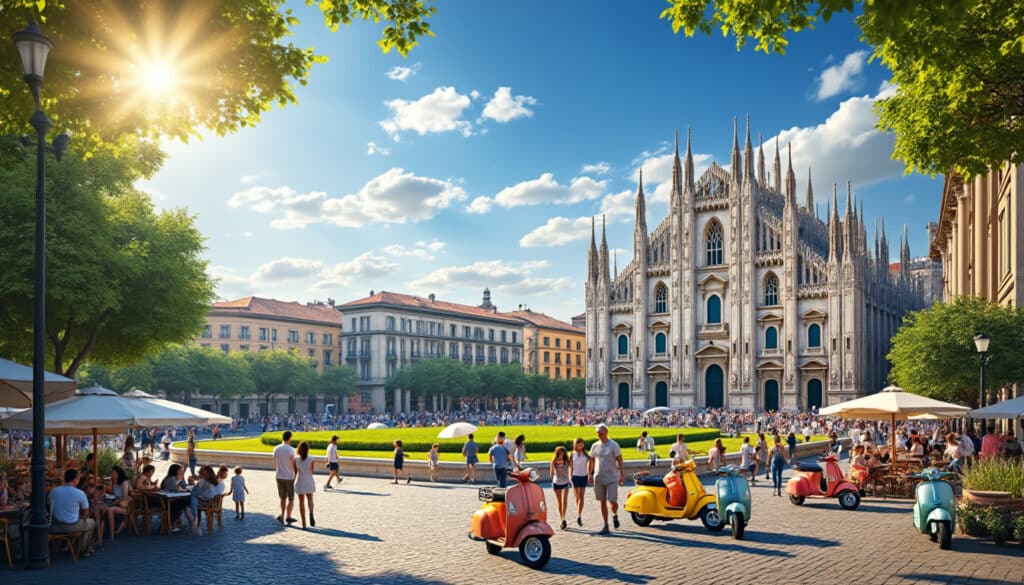
Welcome to the bustling metropolis of Milan, where the climate is as dynamic and vibrant as the city itself. Milan, the fashion capital of the world, offers a unique blend of climatic conditions that artfully complement its rich history, cultural…
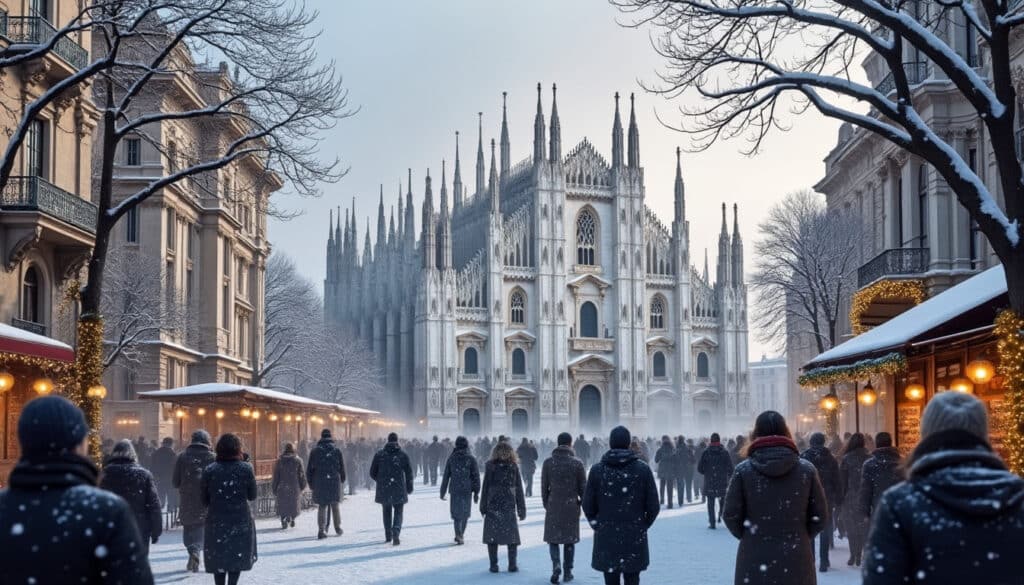
Despite its reputation as a fashion capital, Milan is not just about high-end boutiques and catwalks. It’s a city where the weather plays a significant role, especially during the cold months. The climate in Milan can be a fascinating subject,…

As the warm summer rays drench the streets of Milan, locals and tourists alike prepare to navigate the challenges and delights that come with the hot weather. With temperatures soaring, fashion considerations take on new dimensions, adjusting not only one’s…
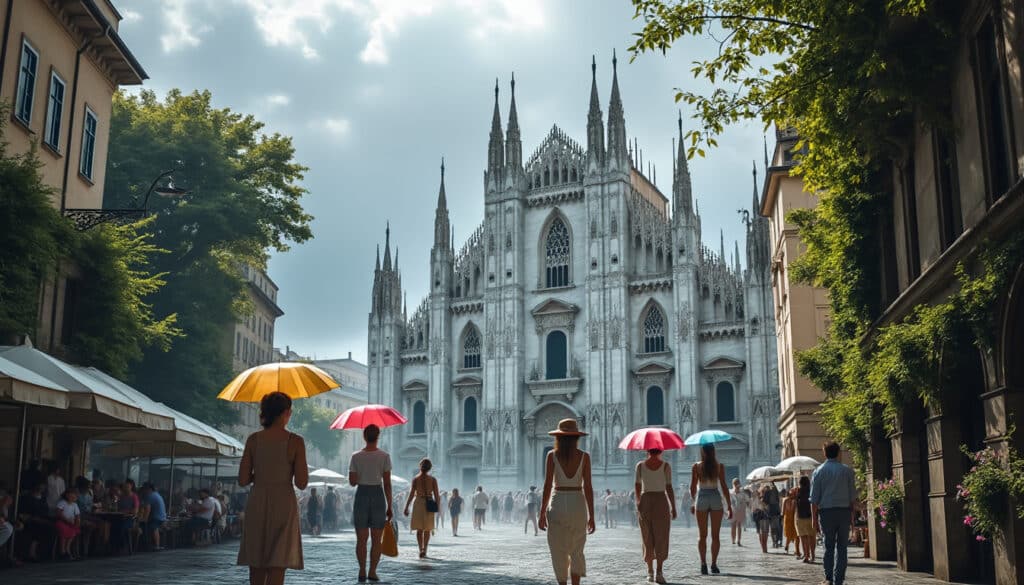
Milan, one of Italy’s most cosmopolitan cities, is famed for its bustling fashion scene, historical architecture, and vibrant culture. Yet, there’s another, less glamorous characteristic that defines its ambiance—the humidity. Milan’s climate is marked by its variation in humidity levels,…

Is Milan warm throughout the year?
Milan, a city synonymous with fashion and design, is also well-known for its diverse climate. Situated in the northern part of Italy, Milan experiences distinct weather patterns that can surprise visitors unaccustomed to its seasonal variations. While the city’s summer…

Rain and precipitation in Milan
Milan, known for its exquisite fashion scene and historic architecture, experiences its own unique weather patterns that reflect the subtropical climates. Rain and precipitation in Milan create a captivating backdrop to this vibrant city, not only shaping the landscape and…

Milan, with its iconic fashion scene and architectural grandeur, experiences a diverse array of seasons, each offering its unique charm and challenges. Known for brands like Armani, Dolce & Gabbana, and Prada, the city doesn’t just set trends in fashion…
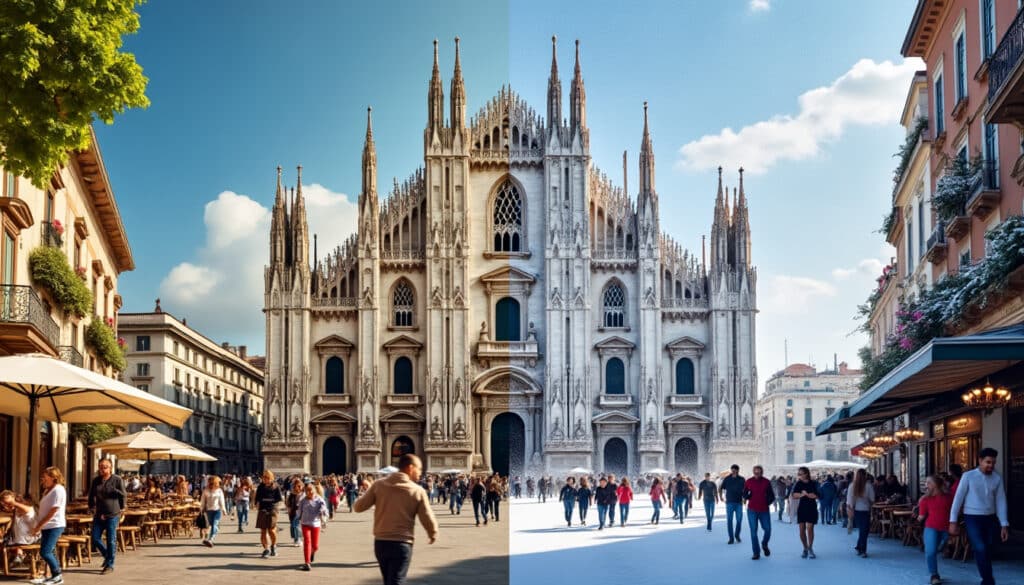
From the bustling streets of Corso Buenos Aires to the historic grandeur of the Duomo di Milano, the city of Milan is a tapestry of culture, history, and modernity. Yet, beneath its architectural brilliance and fashion-forward image, there’s an ever-changing…
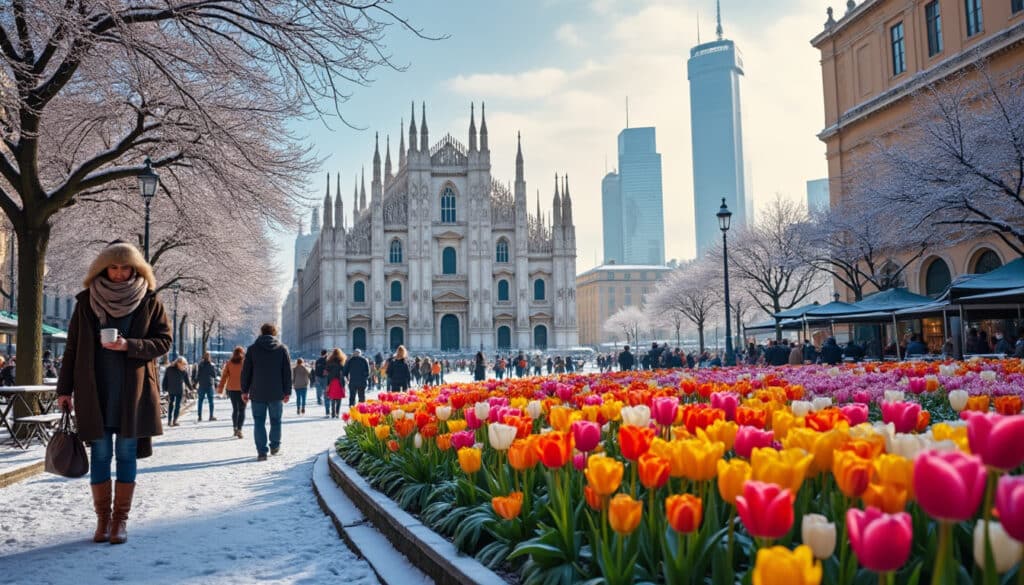
Exploring Milan month by month offers a fascinating journey through its dynamic climates and seasonal transitions. Whether you’re sauntering along its cobbled streets during a balmy summer or admiring its historic architecture under winter’s grayish canopy, Milan’s weather paints the…

What is the weather like in Milan?
When exploring the fashionable streets of Milan, understanding the weather is crucial for planning a trip or daily activities. Milan, known for its exquisite fashion scene, stunning architecture, and vibrant culture, experiences a varied climate throughout the year. From the…



